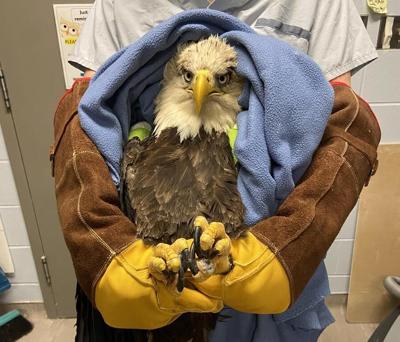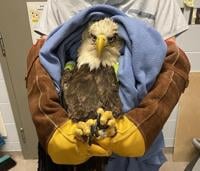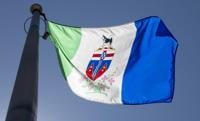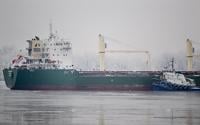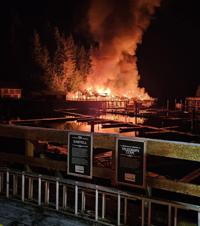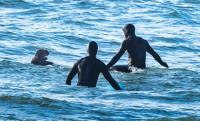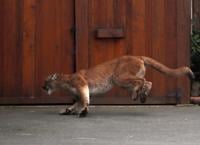He won't be able to soar into the skies or skim the waters with his wings, but a bald eagle treated at a veterinary college at the University of Prince Edward Island after being hit by a car in October 2021 is doing well and settling in a new home.
Bald eagle 450 ã the 450th patient of the Atlantic Veterinary College hospital in 2021 ã is believed to be only the second bird in the world to receive surgery for a spinal cord compression.
"It was maybe done on a penguin like 20 years ago, but there were no real papers on it," wildlife technician Fiep de Bie said in a recent interview, adding that the procedure is "sometimes" done on cats or dogs.
"That was very exciting. A week after the surgery, the eagle was able to stand, so we knew that we were going in the right direction," de Bie said.
When 450 was brought into the clinic, he had extensive head injuries and small cuts and bruises on his legs, she said. "He had a lot of blood on his head and all his feathers on his head were gone."
A week after he was admitted, she said staff noticed the eagle wasn't able to stand.
"We thought, 'What's going on?' We took X-rays and we noticed that there was an issue with the spine, but we couldn't see precisely what it was. We did a CT scan."
The CT scan confirmed a spinal fracture, de Bie said. "It also showed a spinal cord compression. The nerves are sort of pinched. That caused paralysis."
And while the spinal surgery was a success, she said it was the secondary injuries that were particularly troubling. The bird, she said, had a long recovery ahead.
The eagle would stand and lean on its wrists, which caused injury because the skin in that area is delicate, de Bie said. It also had some wounds on its feet and wasn't able to perch, she added.
"We considered euthanasia a couple of times," she said.
"We thought, 'Well, are we going to heal all of this? Is it going to happen?' But this eagle showed so much determination and improvement every time that we were so encouraged that we kept on going .... He went outside, he started perching, his feet were healing, so from there, there was no looking back. It was quite special."
De Bie said eagle 450 has "quite the personality" and described him as a "talker."
"I really don't know what it means," she said with a laugh. "It doesn't come across as stressful or something. It's more like, acknowledging you. It's kind of nice to hear. Like, 'Oh, hello.ã"
He is partial to quail and his favourite toy was a bright, bubble gum pink kiddie pool that he liked to dip and clean his beak in, she said.
As the bird's health improved, she said staff began to look for a home.
The damage in the wrist bone was "too severe" for the bird to fly long distances, she said. The bird is about six years old, and staff are not yet sure of its sex. The lifespan of a bald eagle is about 30 years.
"We thought that's a death sentence for this animal."
They turned to Hope for Wildlife in Seaforth, N.S., which rescues, rehabilitates and releases wild animals, and also educates people about them. Hope Swinimer, founder of the centre, said she is excited about the new arrival. They plan on calling him "Buddy," she said, a name that came through stories about him in the media.
"I always call animals, 'Hey, buddy,'" de Bie said. "Usually I wouldn't talk to wildlife at all because we want them to be released. But sometimes, I just say 'buddy,' and I think one of the reporters picked up on that. And then it became Buddy."
The bird will be driven in Friday from P.E.I. to Halifax and take up residence in a 15-metre-long, three-metre-high enclosure built for him that boasts an ocean view to one side and a wooded area on another.
"He'll get lots of fresh air, he's got a beautiful view, he'll get lots of stimulation," Swinimer said.
Staff have also put in logs left behind by post-tropical storm Fiona, as perches for the bird, she said. "Of course, we're worried because we're hoping he'll settle in and be comfortable."
"My biggest fear is that he might be very nervous. We'll reassess if that happens," Swinimer said. "We want all of our education animals to have a good life with us. I'm really hoping that with a little bit of time and patience, on both our parts, that he'll settle in quite nicely."
But de Bie is not worried.
"He's lucky," she said. "He's quite the super trooper."
This report by üСÜꪤüýò¿Øéóæòêü was first published Jan. 6, 2023.

